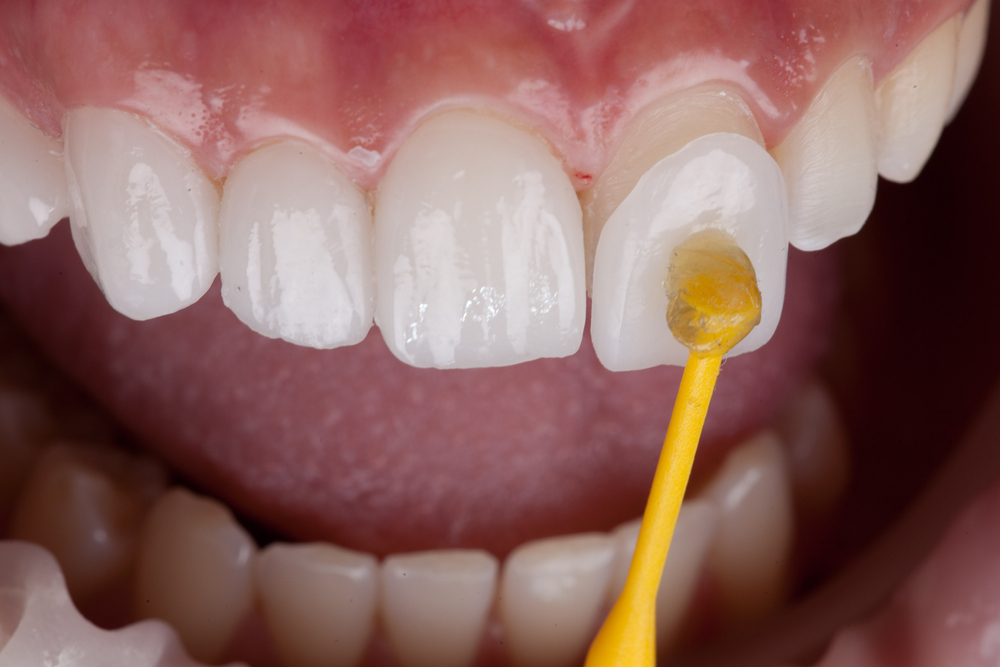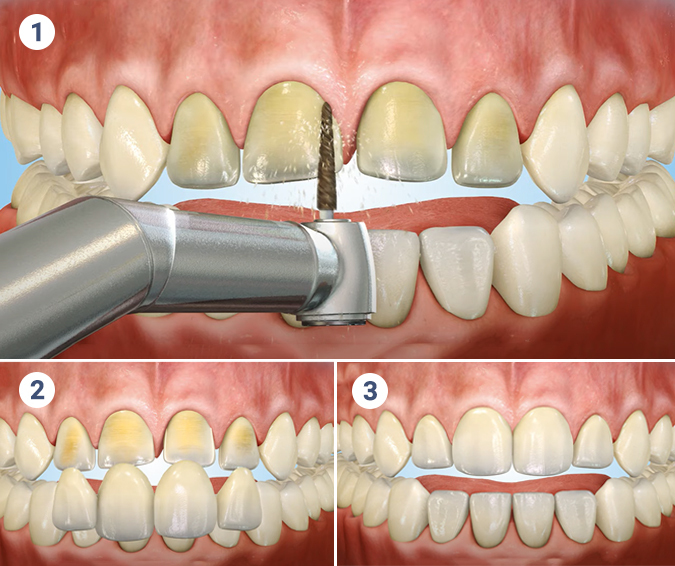All About Veneers: Discover the Perks and Makes Use Of for a Radiant Smile
Veneers have become a desired option in aesthetic dentistry, understood for their capability to improve smiles efficiently. These thin shells can deal with a range of oral imperfections, such as chips and discoloration. Comprehending the benefits, procedures, and types associated with obtaining veneers is essential for any person considering this alternative. What aspects should one weigh before making such a decision? Exploring the information can disclose whether veneers are the best choice for a radiant smile.
What Are Veneers?

The application process entails an oral specialist eliminating a percentage of enamel from the tooth to guarantee an appropriate fit. When fastened, veneers can give an all-natural appearance that carefully resembles actual teeth, making them a preferred choice among those looking to accomplish a glowing smile. Additionally, veneers can add to the overall stamina of the teeth, supplying protection versus further damages. Their versatility and effectiveness make them an important option for enhancing both the feature and appearances of an individual's oral profile.
Sorts Of Veneers Available
There are 2 key kinds of veneers offered for dental reconstruction: porcelain veneers and composite veneers. Dental Veneers. Porcelain veneers use a resilient and natural-looking solution, while composite veneers offer an even more affordable option with simpler application methods. Understanding the differences between these options can aid individuals make informed decisions concerning their oral visual appeals
Porcelain Veneers Overview
Porcelain veneers, a preferred selection in aesthetic dentistry, offer a transformative remedy for individuals seeking to boost their smiles. These slim coverings are custom-crafted from high-grade ceramic materials, designed to bond flawlessly to the front surface of teeth. Their aesthetic allure is notable; porcelain simulates the natural transparency of enamel, resulting in a realistic appearance. Furthermore, porcelain veneers are highly long lasting, immune to staining, and can properly hide problems such as chips, voids, or discoloration. The procedure typically includes minimal tooth prep work, maintaining much of the all-natural tooth framework. Patients commonly appreciate the resilient outcomes, making porcelain veneers a favored choice for those wanting a confident and radiant smile while maintaining capability and oral health.
Composite Veneers Explained
Composite veneers act as an appealing choice to porcelain choices, particularly for those looking for a more affordable remedy for smile improvement. Made from a tooth-colored material, these veneers are used directly to the teeth, enabling fast changes during the procedure (Porcelain Veneers). The bonding process usually needs less tooth decrease contrasted to porcelain veneers, maintaining even more of the all-natural tooth framework. Compound veneers can effectively address issues such as staining, gaps, and minor imbalances. While they might not be as sturdy or stain-resistant as porcelain, their affordability and convenience of application make them a prominent choice for numerous people. Regular upkeep can help ensure long life, making composite veneers a possible alternative for attaining a glowing smile

Advantages of Getting Veneers
While numerous individuals seek to enhance their smiles, veneers supply a transformative service that combines visual allure with useful benefits. One significant advantage of veneers is their capacity to remedy numerous oral flaws, such as discoloration, chips, and voids. This can cause a more consistent and pleasing look, enhancing positive self-image and enhancing social interactions.
In addition, veneers are extremely long lasting, commonly lasting over a years with correct care. They are stain-resistant, making them an appealing choice for those worried about preserving an intense smile. The treatment for using veneers is usually minimally intrusive, preserving even more of the natural tooth structure contrasted to various other cosmetic alternatives.
Additionally, veneers can boost the functionality of teeth, assisting in better alignment and bite. On the whole, the benefits of getting veneers expand beyond simple looks, offering people a complete improvement to their oral health and wellness and general lifestyle.
Typical Uses for Veneers

Cosmetic Improvement Solutions
Aesthetic enhancement options commonly utilize veneers to resolve a selection of dental flaws, boosting both look and self-confidence. These slim shells, commonly made of porcelain or composite material, successfully cover stained, discolored, or twisted teeth, supplying a brighter, more consistent smile. Veneers are likewise a preferred choice for those with spaces in between teeth, as they can produce a smooth appearance without the requirement for orthodontic therapy. In addition, people seeking to modify the shape or dimension of their teeth can achieve their wanted results through veneers, supplying a non-invasive choice to a lot more extensive oral procedures. In general, veneers act as a reliable and versatile option for boosting visual appeal in cosmetic dentistry.
Fixing Tooth Imperfections
Tooth imperfections can significantly influence a person's self-esteem and overall oral health and wellness. Veneers offer as an effective service for dealing with different aesthetic issues, such as chips, fractures, and staining. These slim coverings of porcelain or composite material are custom-made to fit over the front surface area of teeth, concealing imperfections and producing a more consistent appearance. By efficiently concealing flaws, veneers can recover self-confidence in one's smile, leading to improved social interactions and individual complete satisfaction. Furthermore, they are resistant to spots and can supply a resilient option for those seeking a brighter smile. Generally, veneers present a practical choice for people aiming to improve their oral aesthetic appeals while addressing particular tooth flaws.
Alignment and Spacing Improvement
Although numerous individuals look for orthodontic therapies to attain a straight smile, veneers supply a different solution for those with small positioning concerns and spacing issues. These thin shells made from porcelain or composite material can properly disguise flaws such as tiny voids in between teeth or small imbalances. By sticking to the front surface of the teeth, veneers visit here create the impression of a more consistent appearance without the demand for substantial orthodontic work. This makes them an appealing choice for individuals trying to find immediate outcomes. Furthermore, veneers can be tailored to match the bordering teeth, boosting general visual appeals. Therefore, they work as a versatile device in cosmetic dentistry, giving clients with a brighter, extra straightened smile.
The Refine of Getting Veneers
The trip to attaining a glowing smile commonly begins with the meticulous process of obtaining veneers. A consultation with an oral professional is vital. Throughout this consultation, the dental professional examines the patient's dental health and wellness and reviews aesthetic goals. If veneers are regarded ideal, the next step entails tooth preparation, where a slim layer of enamel is gotten rid of to ensure an appropriate fit. Impressions of the teeth are after that taken, usually gone along with by electronic imaging to create the custom veneers.
Once the veneers are crafted, generally in a dental laboratory, a follow-up appointment is set up for positioning. The dentist checks the fit and color before completely bonding the veneers to the teeth utilizing a specialized adhesive. Lastly, any adjustments are made to make sure comfort and appearance. This all-encompassing procedure culminates in a transformed smile, enhancing both appearances and confidence for those looking for oral enhancement.
Upkeep and Treatment for Veneers
Veneers need diligent upkeep and treatment to ensure their long life and appearance. Routine oral exams are necessary, as an expert can examine the problem of the veneers and surrounding teeth. Daily oral hygiene practices, consisting of cleaning and flossing, must be maintained to avoid plaque accumulation and periodontal disease. It is advisable to make use of a non-abrasive toothpaste to prevent scraping the veneer surface.
In addition, patients ought to be mindful with their diet plan. Difficult or sticky foods can harm veneers, so moderation is vital. Avoiding tobacco and excessive usage of tarnishing materials like coffee or red a glass of wine can additionally aid maintain their appearance. Wearing a mouthguard during sporting activities or grinding can shield veneers from potential cracks. By sticking to these treatment guidelines, individuals can enjoy the visual benefits of veneers while guaranteeing their sturdiness and functionality for many years ahead.
Are Veneers Right for You?
Wondering if veneers are the appropriate option for one's oral issues? People considering veneers need to examine their details dental problems, such as stained, chipped, or misaligned teeth. Veneers are especially valuable for those looking for a quick aesthetic enhancement without comprehensive orthodontic therapy. Candidates typically have excellent oral wellness and sufficient enamel, as the application process includes a very little reduction of tooth framework.
Individuals with serious dental concerns or gum tissue condition may need alternate therapies. It's also important to note that veneers need a commitment to dental health and normal oral sees. Prospective people ought to consult an oral professional to review their objectives, assess the problem of their teeth, and understand the potential risks and advantages. Eventually, the choice for veneers ought to align with one's long-lasting dental wellness objectives and lifestyle choices, making certain that they are a sustainable and appropriate choice.
Regularly Asked Inquiries
How Much Time Do Veneers Commonly Last?
Veneers usually last in between 10 to 15 years, depending upon variables such as dental health, way of life choices, and the materials made use of. Regular dental examinations can help preserve their long life and overall appearance.
Can Veneers Be Fixed if Damaged?
Yes, veneers can be repaired if harmed. Dental experts often use bonding materials or replace the veneer completely, relying on the extent of the damage, making sure the repair preserves the visual charm and feature of the initial veneer.
Are Veneers Suitable for Kid or Teenagers?
Veneers are normally not recommended for teenagers or kids because of their developing teeth and jaws. Dentists commonly encourage waiting till the adult years when the teeth are completely created for excellent results and long life.

Do Veneers Require Anesthetic During Application?
Veneers normally do not need anesthesia during application, as the procedure is generally minimally invasive. However, some why not look here people might experience level of sensitivity, motivating the dental practitioner to recommend local anesthesia for added convenience during the process.
Can I Whiten My Teeth if I Have Veneers?
Teeth whitening items do not impact veneers, as they are not porous. However, individuals with veneers might take into consideration specialist cleaning or replacement alternatives to achieve an uniform shade with their natural teeth, if needed.
There are 2 key types of veneers offered for dental repair: porcelain veneers and composite veneers. Porcelain veneers supply a natural-looking and sturdy remedy, while composite veneers give a more affordable option with easier application approaches. The bonding process usually requires much less tooth decrease compared to porcelain veneers, maintaining even more of the natural tooth structure. Furthermore, individuals looking for to change the form or size of their teeth continue reading this can accomplish their desired results via veneers, using a non-invasive alternative to a lot more substantial oral procedures. People considering veneers need to evaluate their certain oral issues, such as stained, damaged, or misaligned teeth.